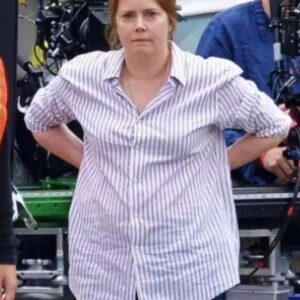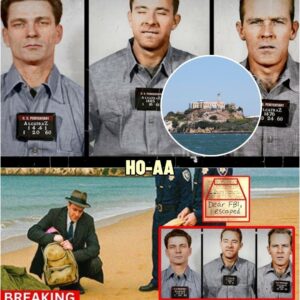The Morning That Should Have Been Ordinary
Some mornings pass unnoticed — simple, uneventful, destined to fade into routine. Last Tuesday should have been one of them: drive to work, grab coffee, answer emails, survive another weekday.
But fate rarely clears its throat before it changes your life.
Halfway down the empty stretch of Maple Street, I caught movement near the fence of an abandoned lot. A tan dog sat tied to a wooden post. It wasn’t barking, straining, or showing fear. It just waited — calm, silent, eyes fixed on the horizon like it was expecting someone.
That stillness was eerie enough. But then I saw the envelope — a manila one tied neatly around its neck with twine. Across the front, in bold block letters, was my name.
For a long moment, I just sat there in the car, the engine humming. The whole scene felt staged — the dog, the fence, even the rising sun positioned just so.
Finally, curiosity overpowered fear. I stepped out.

The Envelope That Shouldn’t Exist
The dog didn’t move when I approached. Its eyes followed me — intelligent, familiar somehow, like I’d seen them before in another lifetime.
I untied the envelope with trembling fingers. The paper was slightly worn but dry, as if it had been placed there recently. The handwriting — sharp, deliberate — made my pulse quicken.
I opened it.
Inside was a single photograph.
At first, it didn’t make sense. Then my stomach dropped. It was our old house — the one my family had left twenty years ago under circumstances we never discussed.
Everything was there: the white picket fence, my mother’s rose bushes, the crack in the step my brother tripped on.
But the photo wasn’t taken from the street. It had been shot from the woods behind our yard, close enough to see inside the windows.
And scrawled across the bottom, in smeared red ink, were four chilling words:
“Do you remember me?”
The Memory That Should Have Stayed Buried
Those words hit like a punch.
I’d told myself for years that the move was normal — a job transfer, a better neighborhood. But deep down, I’d always known there was more to it. My parents had packed us up one weekend, sold the house, and forbade us from asking questions.
And yet, standing there on that deserted road, I began to remember.
The attic.
The diary.
The whispers behind the wall.
We’d found that diary as kids — hidden under a loose floorboard. The handwriting wasn’t my father’s or mother’s, but the words inside described us — what we ate, what we wore, what we said when no one else was around. It spoke of “watching the family,” of “protecting them from what they cannot see.”
When my mother discovered it, she’d gone pale. My father burned it that same night. We left the next morning.
“Forget about it,” he’d said. “It’s over.”
But it never was.
The Messenger With Silent Eyes
The dog stood perfectly still, watching me as if waiting for me to understand something it couldn’t say. There was intelligence there — too much for a stray.
I crouched down. “Who sent you?” I whispered.
The animal nudged the envelope with its nose — an invitation to look deeper. That’s when I noticed the small brass tag on its collar.
Two letters engraved into the metal: R.M.
At first, they meant nothing. Then my heart nearly stopped.
My father’s name was Robert Matthews.
The Return of the Forgotten House
I don’t remember deciding to drive. One moment I was staring at the dog; the next, the photo was on my passenger seat and the dog was curled up in the back, quiet and obedient.
Every few minutes, it’d glance up in the rearview mirror, as if guiding me somewhere.
I told myself I was only going to look — to prove this was a prank. But deep down, I knew better. Something — or someone — was pulling me back.
The drive to our old town took three hours. I didn’t play music. Didn’t call anyone. The silence was filled only with the hum of the tires and the memory of a house that had never really let me go.
The House That Waited Twenty Years
When I finally reached Hawthorne County, the landmarks felt both familiar and wrong — smaller, hollowed out by time. The dirt road to our old property was nearly swallowed by weeds, but the mailbox was still there. My father’s name was faded, but readable.
The dog stirred, tail wagging faintly, like it recognized home.
The house stood at the end of the road, half-eaten by vines and decay. The windows were boarded, the paint peeling — yet something about it felt untouched, as though someone had been tending to it all these years.
Then I saw it.
A faint light glowing in the upstairs window.
My heart thudded. The place hadn’t had power in decades.
The Return of the Past
I checked my phone — No Signal.
That’s when I saw it: another envelope, sitting neatly on the porch, pinned under a smooth river stone. Same handwriting. Same deliberate care.
I opened it slowly.
Inside were two things — a small brass key identical to the one that opened my father’s study, and a note written in that same bleeding red ink:
“You were never supposed to forget.”
The dog let out a low whine. I turned toward the road, but it was empty — no cars, no wind, no sound.
I held the key in my hand, the metal warm against my skin. I knew then that whatever secret had driven my parents to flee was still here, sealed inside the house — waiting for me to unlock it.
The Unfinished Chapter
The front door creaked open with surprising ease. The air smelled of dust, wood, and something faintly familiar — like old perfume.
The living room was untouched. Furniture draped in white sheets. The fireplace blackened with old soot. Family photos still hung on the walls, faces blurred by time.
I moved deeper into the house, the floor groaning beneath my weight. Every creak echoed like a memory.
The dog followed closely behind, silent but alert, its eyes glowing faintly in the dim light.
And then, from somewhere deep inside the house, I heard it — a whisper.
“Welcome home.”
The voice was soft, almost kind. And unmistakable.
It was my father’s.
A Final Thought
I don’t know what I’ll find in this house. Maybe answers. Maybe ghosts. Maybe both.
But I do know this: some secrets don’t die — they wait. Patiently. Quietly.
Maybe the dog wasn’t a messenger at all. Maybe it was a reminder.
That the past we bury doesn’t always stay buried. Sometimes it finds its way back — on four legs, with an envelope around its neck, asking the question we spend our whole lives avoiding:
Do you remember me?





